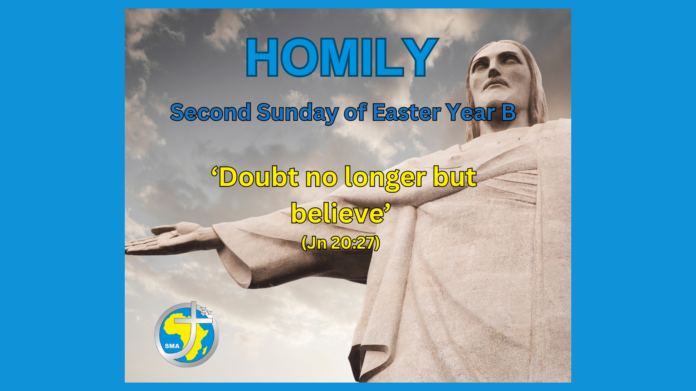Readings: Acts 4:32-25; 1 John 1-6; John 20:19 – 31
Theme: Touching the Wounds of Christ
When we feel anxious or threatened, our natural reaction is to withdraw to a safe place, lock the doors, and wait for the danger to pass. This is precisely what the disciples of Jesus do following the capture, torture and horrific death of their master. Despite the Mary Magdalene’s telling them that she had seen the Lord, they remain paralysed by their fear, sense of failure, and perhaps also by guilt at having deserted their Master at the end. It is in such a confused state that the Risen Jesus comes to them, not with words of blame or recrimination, but with his peace. His first words are ‘Peace be with you’ (Jn 20:19). The importance of this greeting is accentuated by being repeated three times in today’s gospel passage.
We usually think of peace as the absence of conflict and turmoil, the ending of all those things that make us anxious and fearful – and there are indeed many reasons for us to be anxious and fearful in our world today. However, the peace Jesus offers is something more profound than the absence of war or the resolution of conflict. Earlier in John’s Gospel, Jesus says to his disciples: ‘My peace I leave with you; my peace I give to you. I do not give to you as the world gives. Do not let your hearts be troubled, and do not let them be afraid’ (Jn 14:27). The peace Jesus offers us is not something that depends On our own resources. It is a peace that can only be received as a gift ‘from above’ – a gift that enables us to live freely, and even joyfully, in the midst of strife, stress and conflict.
Having freed his disciples from the prison of their own making by his gift of peace, the Risen Jesus immediately commissions them to continue his mission of peace and forgiveness. For this, he invests them with the gift of the Spirit. ‘As the Father sent me, so am I sending you. After saying this he breathed on them and said: Receive the Holy Spirit. For those whose sins you forgive, they are forgiven; for those whose sins you retain, they are retained’ (Jn 20:21-23). As the Risen Jesus came to his disciples, so he comes to us today in the midst of our fears, doubts, pain and confusion. He comes offering us his peace and breathing into our anxious hearts the empowering breath of the Spirit, strengthening us to continue his healing mission of peace and forgiveness in the world of our time.
John tells us that the apostle, Thomas, was not with the group of disciples when Jesus first appeared, though he doesn’t tell us why. Perhaps distancing himself from his former companions was his way of coping with his grief and disillusionment at what had happened to his master. On the following Sunday, however, Thomas is with them when Jesus appears again to his disciples, openly bearing in his Risen body the wounds of his traumatic recent history. It is surely significant that Jesus does not hide his wounds but invites the ‘doubting’ Thomas to touch them and ‘doubt no longer but believe’ (Jn 20:27).
The scarred body of our risen Lord is the ultimate sign of divine empathy. The glorified Christ identifies himself with those whose experiences of pain, loss, trauma, and horror leave scars that never fade. The wounds of our Risen Lord remind us that he knows, understands, and is with us in our pain. The poet Edward Shillito, who witnessed the horrors of World War I, found comfort in the ‘Jesus of the Scars’, who knew what it was like to suffer in human flesh.
The heavens frighten us; they are too calm;
In all the universe we have no place.
Our wounds are hurting us; where is the balm?
Lord Jesus, by Thy Scars, we claim Thy grace.
Aware of the terrible wounds that afflict both the world and the Church today. Jesus invites us, as he invited Thomas, not to recoil in fear, but to bury our doubts, fears and confusion in the wounds of his risen body. As the prophet Isaiah teaches us: ‘By his wounds we are healed’ (Is 54:5). It was Thomas’ response to Jesus’ invitation to touch his wounds (cf. Jn 20:27) that drew from him the greatest act of faith in the Bible: ‘My Lord and my God’ (Jn 20:28). This is the first time in John’s entire gospel, that anyone has used the word ‘God’ to address Jesus. I conclude with a short poem by Malcolm Guite, celebrating the sterling faith of ‘doubting Thomas’.
“We do not know… how can we know the way?”
Courageous master of the awkward question,
You spoke the words the others dared not say
And cut through their evasion and abstraction.
Oh doubting Thomas, father of my faith,
You put your finger on the nub of things
We cannot love some disembodied wraith,
But flesh and blood must be our king of kings.
Your teaching is to touch, embrace, anoint,
Feel after Him and find Him in the flesh.
Because He loved your awkward counter-point
The Word has heard and granted you your wish.
Oh place my hands with yours, help me divine
The wounded God whose wounds are healing mine.
On this Divine Mercy Sunday, and in these difficult and confusing times, we pray that we will find our solace, hope, and courage in the wounded, risen Christ.
Michael McCabe SMA
Click on the play button below to listen to an alternative homily from Fr Tom Casey SMA.
|
|

